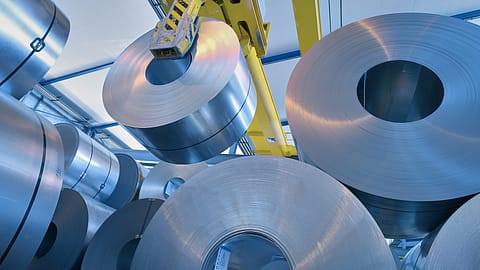Steel stocks tumble as govt imposes export duty
The government on Saturday hiked export duty on a range of finished steel products and iron ore.

Shares of Tata Steel and JSW tanked 13% each on Monday after the government imposed export duty on a range of finished steel products to rein in rising domestic prices.
To improve domestic steel availability, the government on Saturday imposed a 15% export duty on a range of finished steel products which accounted for almost 95% of India's overall finished steel exports in the financial year 2020-21 and FY22. It also hiked export duty on iron ore fines and lumps from 30% to 50%.
With domestic mills opportunistically tapping export markets, finished steel exports have so far accounted for around 10-11% of India's finished steel production in the last two fiscals, according to ICRA.
In FY22, Indian mills recorded a 25% year-on-year growth in finished steel exports as they took the benefit of elevated seaborne prices, says Jayanta Roy, senior vice-president and group head, corporate sector ratings, ICRA. Europe, Vietnam and the Middle East were the three largest destinations for Indian steel exports, together accounting for around 50% of India's overall steel exports.
"We believe that many of these destinations would become less attractive now as mills evaluate the economics of a higher duty. Additionally, with steel export offers for deliveries to Europe being higher by 10-11% over more competitive markets like South-East Asia and the Middle East, the adverse impact of the new export duties on steel exports to Europe would be relatively less severe than that of South-East Asia and the Middle Eastern markets," he adds.
Recommended Stories
The rating agency expects the imposition of the 15% export duty to make exports significantly less attractive, which in turn could exert pressure on domestic steel prices and industry capacity utilisation levels.
With the domestic industry's capacity utilisation levels crossing the 80% mark in FY22 (83% average industry capacity utilisation in FY22) after a gap of seven years, many steelmakers have announced large scale expansion plans accumulating to around 130 million tonnes, to be implemented in the next one decade. Following the export duty levy, the pace of execution of some of these expansion projects could slow down as mill cash flows could weaken significantly going forward if the export duty is maintained over the medium term, ICRA says.
(INR CR)
On the raw material side, the government has hiked the export duty on 58% and above Fe grade iron ore fines and lumps from 30% to 50%. Though this is incrementally positive from the perspective of better availability of domestic iron ore, it may not be a material shock-absorber as it affects the economics of only less than 15% of total iron ore that was exported by domestic miners in FY22, says ICRA.
Over 86% of the iron ore exported by miners in FY22 was in the below 58% Fe grade category, which anyway has limited use in domestic steelmaking without further processing through beneficiation, the report adds.
On the coal front, the government has withdrawn the 5% and 2.5% import duties on coke and coal respectively, which is also marginally positive, according to ICRA.
Roy, however, says the impact of the imposition of a 45% export duty (from nil earlier) on iron ore pellets remain a major dampener for merchant pellet makers, which had exported 11.5 million tonnes of pellets in FY22 valued at around $2 billion. "With pellet exports accounting for around 15% of the domestic pellet production, industry asset utilisations are likely to be adversely impacted and domestic pellet prices could come under severe pressure going forward, putting at risk the expansion plans of several ongoing merchant pellet projects in the country," he adds.
In the last two years, many steelmakers benefitted from strong margins due to highly profitable pellet exports, which now appear unviable, the rating agency says, adding that the absence of pellet exports from their sales mix would in turn further pressurise operating margins in the near term.